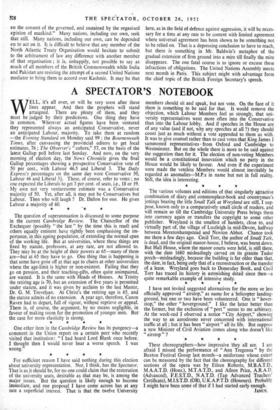The question of superannuation is discussed to some purpose in
the current Cambridge Review. The Chancellor of the Exchequer (possibly " the late " by the time this is read) and others equally eminent have rightly been emphasising the im- portance, in this ageing population, of extending the normal span of the working life. But at universities, where these things are fixed by statute, professors, at any rate, are not allowed to. They may be at the height of their powers at 65—many of them are—but at 65 they have to go. One thing that is happening is that some have gone off at that age to chairs at other universities where the age-limit is higher or non-existent. Failing that they go on pension, and their teaching-gifts, often quite unimpaired, are wasted. It is the same with Heads of Houses. At Trinity the retiring age is 70, but an extension of five years is permitted under statute, and it was given by acclaim to the last Master, Dr. G. M. Trevelyan. At Christ's the retiring age is 65, and the statute admits of no extension. A year ago, therefore, Canon Raven had to depart, full of vigour, without reprieve or appeal. There is, of course, the argument, by no means negligible, in favour of making room for the promotion of younger men. But/ the case for more elasticity is strong.


































 Previous page
Previous page